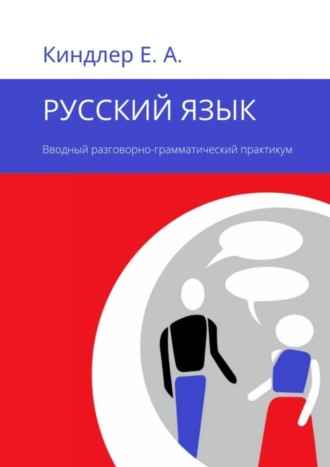
Полная версия
Русский язык. Вводный разговорно-грамматический практикум
Здравствуйте! Меня зовут Ольга. Мне 30 лет. Я врач. Я из Казахстана, но сейчас живу в России. Я замужем и у меня есть семья. Моего мужа зовут Петер, ему 36 лет. Он бизнесмен и у него своя фирма. У нас есть дочь. Ее зовут Герта. Ей 7 лет и она уже учится в школе. Мои родители живут в Астане. Моего папу зовут Олег, ему 60 лет. Он инженер, и он еще работает. Мою маму зовут Галина. Ей 66 лет. Она пенсионерка и уже не работает. У меня также есть брат и сестра. Моего брата зовут Максим, ему 35 лет. Он живёт в Германии. Он еще не женат. Мою сестру зовут Елена. Она живет и работает в Америке. Она замужем и у неё есть дети. Дети учатся вместе в школе.
Hi. My name is Alex and I am 25 years old. I am a journalist. I am not married, but I have a girlfriend. Her name is Elena. She is 23 years old. She is an economist.
Hi. My name is Nastya. I am 20 years old. I am a student, studying at the university, at the faculty of linguistics and still do not work. I am not married, but I have a boyfriend. His name is Andrey, he is 21 years old. We study together.
Hello. My name is Maria and I am 35 years old. I am from Russia. I am a teacher. I’m married. My husband’s name is Ivan. He’s a policeman. We have children. My son’s name is Dmitry, he is 7 years old. My daughter’s name is Margarita, she is 3 years old.
Hello! My name is Olga. I am 30 years old. I am a doctor. I am from Kazakhstan, but now I live in Russia. I am married and have a family. My husband’s name is Peter, he is 36 years old. He is a businessman and has his own company. We have a daughter. Her name is Hertha. She is 7 years old and she is already in school. My parents live in Astana. My father’s name is Oleg, he is 60 years old. He is an engineer, and he is still working. My mother’s name is Galina. She is 66 years old. She is a pensioner and is no longer working. I also have a brother and sister. Maxim, he is 35 years old. He lives in St. Petersburg. He is not married yet. My sister’s name is Elena. She also lives and works in St. Petersburg. She is married and has children. Children study together at school.
Grammar comment:
In the texts we will meet cases. In Russian cases are expressed by changing the endings of nouns and adjectives. This is one of the most difficult things in the language, and each case will be considered separately then. For now, try to remember the endings of nouns in indirect cases regarding some standard situations. We have already said that in Russian indirect cases are used when it concerns to name and age.
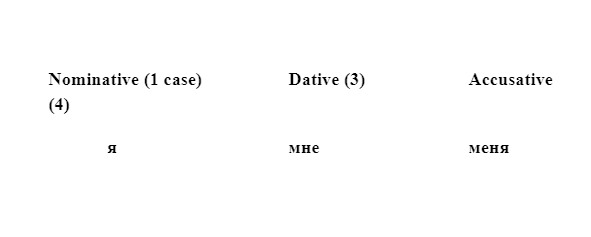
Меня зовут (4 case) – NOT я зовут
Мне 20 лет (3 case) – NOT я 20 лет
Name (4 case)
(masсuline) Моего папу (дедушку, брата, сына) зовут
(feminine) Мою маму (бабушку, сестру, дочь) зовут
(m) твоего, eго, её, нашего, вашего, их
(f) твою, его, её, нашу, вашу, их
Age (3 case)
(m) Моему папе (дедушке, брату, сыну) … год, года, лет
(f) Моей маме (бабушке, сестре, дочери) … год, года, лет
(m) твоему, eго, её, нашему, вашему, их
(f) твоей, его, её, нашей, вашей, их
2) Note:
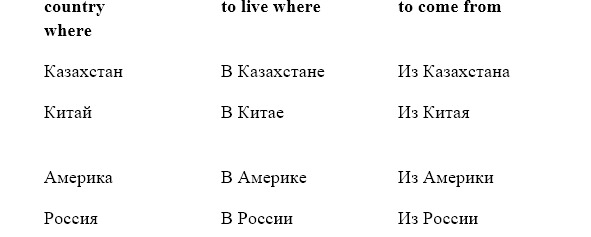
Countries also change endings depending on the case. In Russian almost all countries have either masculine or feminine gender. The endings of the masculine countries – consonant or й, the endings of the feminine countries – а, ия, ея. Depending on the question, where and from where the endings are replaced.
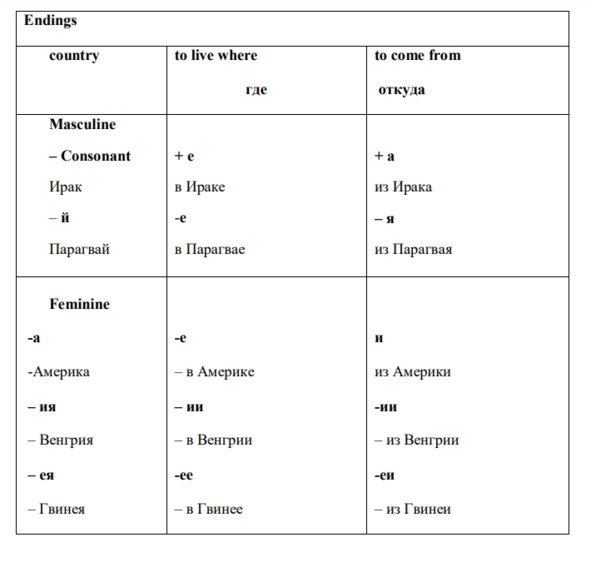
Note: Some feminine countries with hard consonants in the stem have different endings.
Венесуэла – в Венесуэле— из Венесуэлы
Канада – в Канаде – из Канады
Украина – в Украине – из Украины
Аргентина – в Аргентине – из Аргентины
The neuter countries do not change ending
Конго – в Конго – из Конго
Упражнение 5. Write the name and the age of your family members.
Use the pattern
Моего папу зовут…
Моему папе… год, года, лет. Мою маму зовут…
Моей маме… год, года, лет.
Упражнение 6. Make similar dialogs:
– Как зовут твоего папу?
– Моего папу зовут Сергей. А твоего?
– Моего папу зовут Алексей.
– Сколько лет твоей маме?
– Моей маме 50 лет. А твоей.
– Моей маме 41 год.
Упражнение 7. Tell about your interlocutor
Его (её) папу/маму зовут…
Его (её) папе/маме …год, года, лет
Упражнение 8. Fill the table.
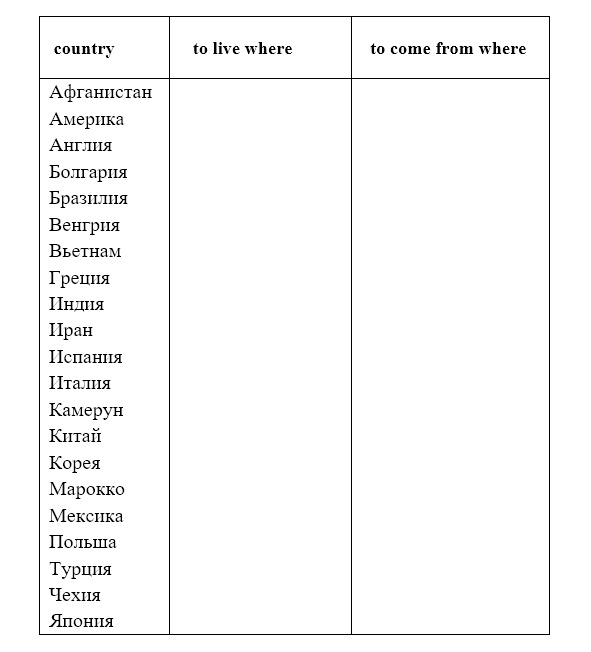
Упражнение 9. Make similar dialogs
– Откуда ты?
– Я из Японии.
– А где ты сейчас живёшь?
– Сейчас я живу в России.
– Откуда Вы?
– Я из Афганистана.
– А где Вы сейчас живёте?
– Сейчас я живу в Иране.
Урок 6. Хобби. Языки. Подчинительные союзы.
Lesson 6. The hobby. The languages. Subordinating Conjunction
Хобби
Иностранные языки – foreign languages
Компьютерные игры – сomputer games
Музыка – music
Охота – hunting
Путешествия – traveling
Рисование – painting
Рыбалка – fishing
Спорт – sport
Танцы – dancing
Фотография – photography
Чтение – reading
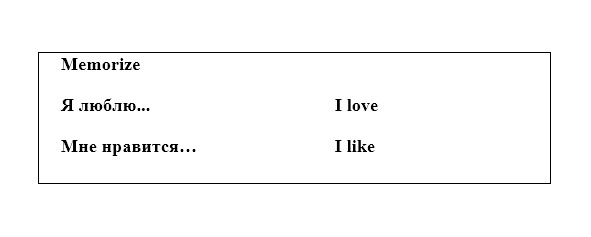
They are mostly used interchangeably, but «я люблю» expresses a stronger feeling than «мне нравится». Нравиться is mostly used for things and любить for people or animals.
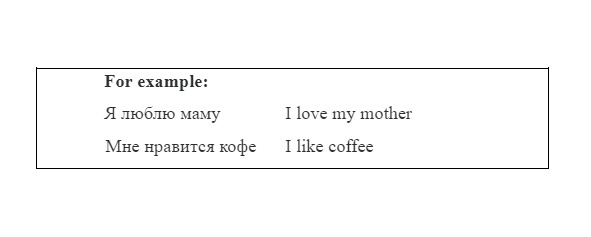
When it comes to people and relationships these combinations of words have some additional nuances.
For example:
Мне нравятся Мария.
I like Maria.
I find Maria attractive and interesting. I like her as a friend among other friends.
Я люблю Марию.
I’m in love with Maria.
It means a confession of love. If you say «I love you» to a person you have just met, that person would probably be a bit confused or scared.
When it comes to some activities «я люблю» and «мне нравится» are completely interchangeable. But pay attention. This is not the way to say «я нравится» but «мне нравится». It is like in construction «it is pleasant for me».
Упражнение 1. Fill the table with suitable activities
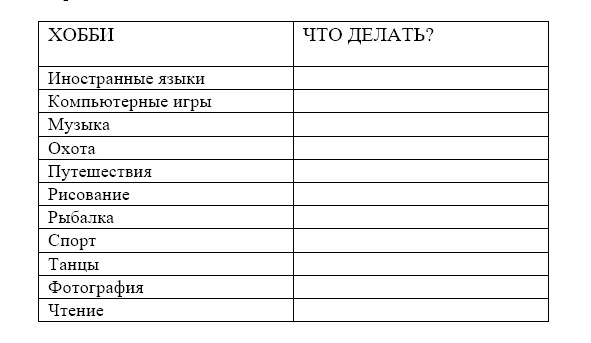
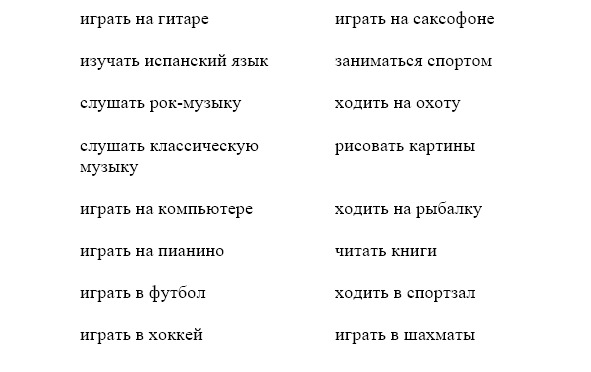
Упражнение 2. Make similar dialogs.
– У тебя есть хобби?
– Да. Моё хобби спорт. Я люблю играть в футбол. А твоё?
– Моё хобби рисование. Я люблю рисовать картины. Мне кажется это очень интересно.
– Do you have a hobby?
– Yes. My hobby is sport. I love to play football. And you?
– My hobby is drawing. I love to paint pictures. It seems to be very interesting.
– У тебя есть хобби?
– Да. Моё хобби музыка. Я люблю играть на гитаре и слушать рок музыку? А ты что любишь делать?
– Я не люблю слушать рок-музыку и не умею играть на гитаре. Я люблю играть на компьютере. Я думаю, это очень интересно.
– Do you have a hobby?
– Yes. My hobby is music. I like to play the guitar and listen to rock music? And what do you like to do?
– I do not like to listen to rock music and do not know how to play the guitar. I like to play on the computer. I think this is very interesting).
Subordinating conjanction:
Что – that,
Потому что – because,
Поэтому – so, that is why.
Упражнение 3. Read the dialog. Pay attention to subordinating conjunction.
– Я знаю, что ты любишь изучать иностранные языки.
– Да. Иностранные языки моё хобби.
– Какие6 иностранные языки ты знаешь?
– Я из Бразилии и мой родной язык португальский. Я хорошо говорю по-испански и по-французски. Мой папа американец, поэтому я хорошо знаю английский. Я также учу русский язык, но ещё плохо говорю по-русски, потому что мне кажется, что он очень сложный.
– Почему ты учишь русский?
– Я учу русский язык, потому что я люблю читать русские книги и хочу работать в России.
Упражнение 4. Answer the question and ask your interlocutor.
Почему Вы учите русский язык?
Почему ты учишь русский язык?
Упражнение 5. Tell about the reason why your interlocutor learns Russian. Use conjunction «потому что», «поэтому».
Она учит русский язык, потому что любит читать русские книги и хочет работать в России.
Она любит читать русские книги и хочет работать в России, поэтому она учит русский язык.
Упражнение 6. Match countries and languages
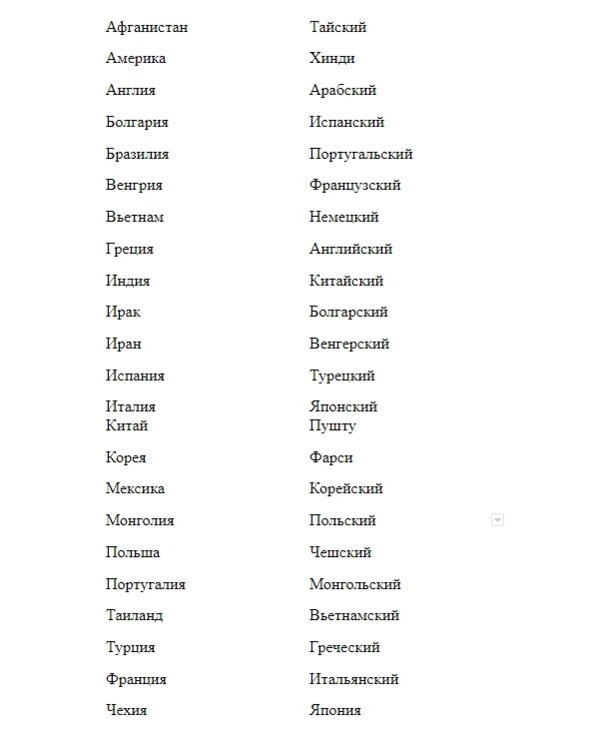
Упражнение 7. What languages do you speak? What languages do you want to learn? На каких языках вы говорите? Какие языки вы хотите выучить?
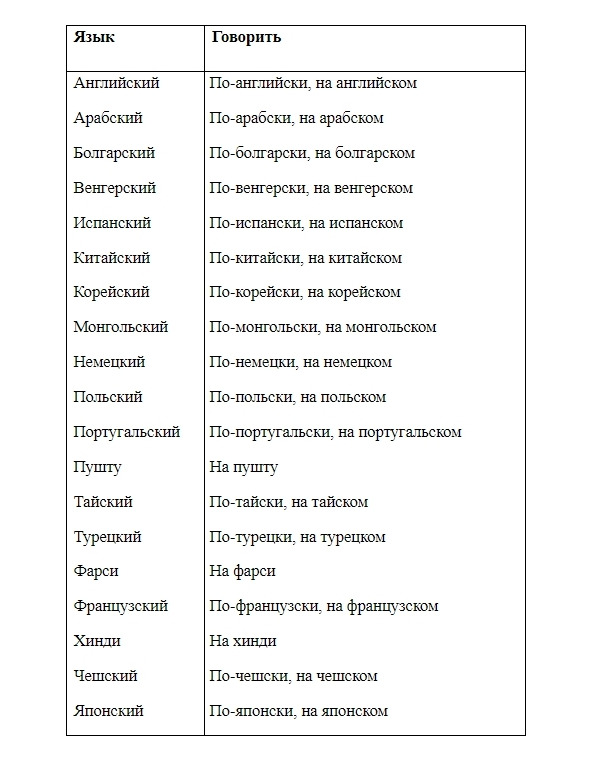
Упражнение 8. Read the texts
Words to texts:
всегда – иногда, always – sometimes
часто – редко, often – seldom
много – мало, many/much – few/little
здесь – там, here – there
к счастью – к несчастью, fortunately – unfortunately
сложный (ая, ое, ые) – простой, difficult – easy
старший/младший, older/younger
обычно – usually
почти – almost
вести домашние дела – lead household
готовить – cook
довольно – quite
зарабатывать – earn
каждую неделю – every week
каждый день – everyday
как – as
конечно – of course
любимые предметы – favorite subjects
общаться – to communicate
по скайпу – by Skype
помогать – to help
предмет – subject
разный – different
свободное время – free time
(в свободное время – in free time
сидеть в интернете – to surf
Привет! Меня зовут Владимир Ергилов. Мне 19 лет. Я из Белоруссии, но сейчас живу в России. Здесь я учусь в университете. Я изучаю экономику, потому что хочу работать экономистом или бизнесменом и зарабатывать много денег. Я не женат, но у меня есть подруга. Ее зовут Света. В свободное время мы ходим в театр, в кино или в кафе. У нас разные хобби. Она любит танцевать, а я не люблю танцевать и не умею, но мне нравится музыка. Я играю на пианино и гитаре. Ещё мне нравится играть в футбол или в хоккей.
Здравствуйте. Меня зовут Катя Иванова. Мне 18 лет. Я из России и сейчас живу в Москве. Я учусь в университете. Я хочу стать переводчиком, поэтому учу иностранные языки. Мой любимый предмет – английский язык. Также я изучаю французский и немецкий. Они довольно сложные, но именно поэтому они мне нравятся. Я хорошо говорю по-английски. Мне нравится говорить на иностранных языках. Обычно я ищу друзей в интернете, чтобы общаться. Это интересный опыт и хорошая практика. Также я люблю спорт и почти каждый день хожу в спортзал. Моя семья большая. У меня есть мама, папа, младший брат и старшая сестра. Мою маму зовут Алевтина. Ей 45 лет. Она работает менеджером. Её хобби фотография. Также она любит готовить. Я хочу готовить также вкусно, как она. Мама очень устаёт, поэтому я всегда помогаю ей вести домашние дела. Моего папу зовут Александр и ему 47 лет. Он инженер. Он часто ездит в другие страны, обычно в Индию или Китай, потому что у него там есть много интересных проектов. Моего брата зовут Коля. Ему 13 лет и он учится в школе. Его любимые предметы – рисование и литература. Он любит играть в футбол и хоккей. Мою сестру зовут Юля, ей 22 года. Она живет в Англии и учится в университете в Лондоне. Она помогает мне учить английский язык. Каждую неделю мы говорим по скайпу. Мою бабушку зовут Антонина. Бабушке 75 лет и она пенсионерка. Она очень добрая и я люблю проводить время с ней. Особенно нам нравиться играть в шахматы. Иногда мы вместе смотрим фильмы. Мой дедушка, к сожалению, уже умер.
Hello! My name is Vladimir Ergilov. I am 19 years old. I am from Belarus, but now I live in Russia. Here I go to university. I study economics because I want to become an economist or businessman and make a lot of money. I am not married, but I have a girlfriend. Her name is Sveta. In our free time we go to the theater, to the cinema or to the cafe. We have different hobbies. She loves to dance, but I do not like to dance and I can`t, but I like music. I play the piano and the guitar. I also like to play soccer or hockey.
Hello. My name is Kate Ivanova. I am 18 years old. I am from Russia and now live in Moscow. I study at University. I want to become a translator, so I’m learning foreign languages. My favorite subject is English. I also study French and German. They are quite difficult, but that is why I like them. I speak good English. I like to speak foreign languages. I usually look for friends on the Internet to chat. This is an interesting experience and good practice. I also love sports and go to the gym almost every day. My family is big. I have a mom, dad, younger brother and older sister. My mother’s name is Alevtina. She is 45 years old. She works as a manager. Her hobby is photography. She also loves to cook. I want to cook as tasty as she is. Mom is very tired, so I always help her with household chores. My dad’s name is Alexander and he is 47 years old. He is an engineer. He often travels to other countries, usually India or China, because he has many interesting projects there. My brother’s name is Kolya. He is 13 years old and is in school. His favorite subjects are drawing and literature. He loves to play soccer and hockey. My sister’s name is Julia, she is 22 years old. She lives in England and studies at a university in London. She helps me learn English. Every week we talk on Skype. My grandmother’s name is Antonina. Grandmother is 75 years old and she is a pensioner. She is very kind and I like to spend time with her. We especially like to play chess. Sometimes we watch movies together. Unfortunately, my grandfather has already died.
Упражнение 9. Translate into Russian
1) in free time 2) always 3) to lead household 4) to cook 5) often 6) many 7) here 8) quite 9) earn 10) every week 11) everyday 12) as 13) few 14) of course 15) seldom 16) favorite subjects
17) fortunately 18) sometimes19) to communicate 20) usually 21) by Skype 22) to help 23) nearly 24) subject 25) different 26) unfortunately 27) there 28) surf the internet 29) tired 30) now
Упражнение 10. Write Antonyms
1) всегда …. 2) там …. 3) часто …. 4) много …. 5) к несчастью
6) здесь …. 7) иногда … 8) к счастью …. 9) мало… 10) редко
Упражнение 11. Fill in the profile
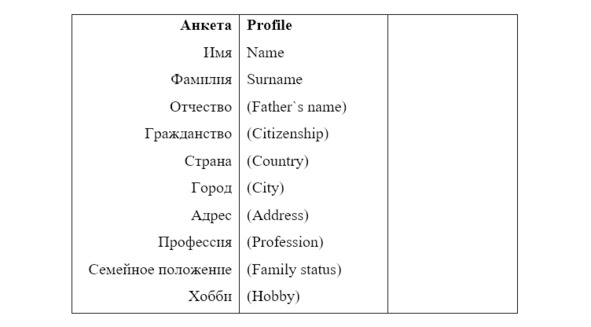
Упражнение 12. Ask two interviewees and then compare the answers. Prepare a short monologue about yourself based on the questions.
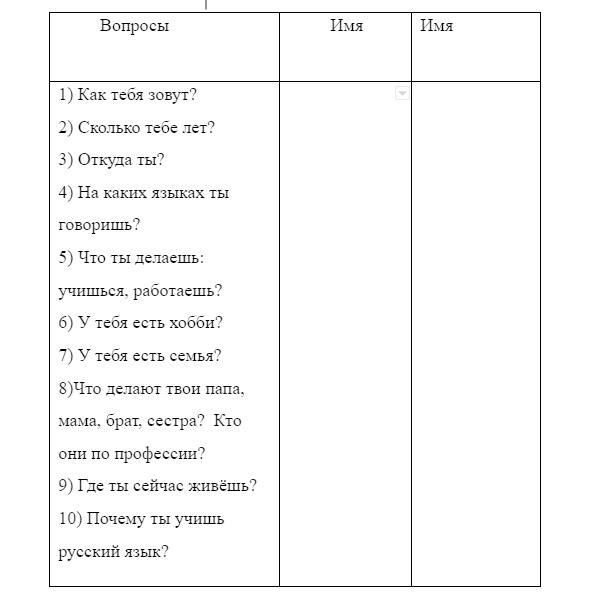
Упражнение 13. Tell about your interlocutor. Use model
Он/она говорит, что…
Урок 7. Мой день. Возвратные глаголы. Местоимение «сам». Lesson 7. My day. Reflexive verbs. The pronoun «сам»
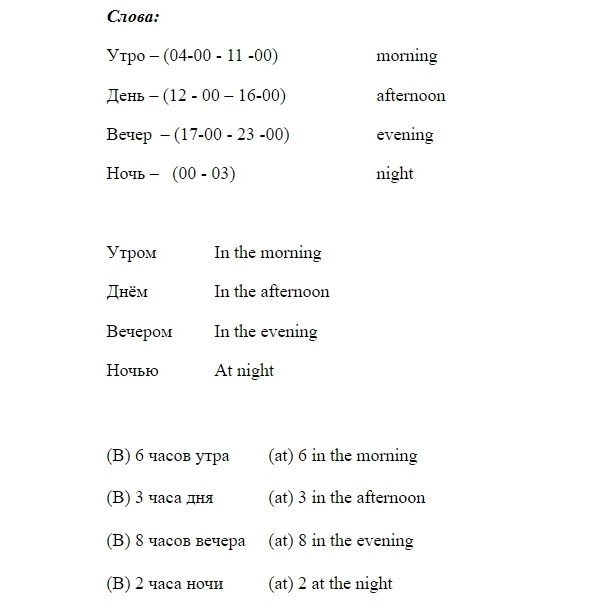
There are as Russian and as in English transitive and reflexive verbs. Transitive verbs are used when an action is transferred to an object, to someone or something. For example.
I wash my child, I wash my car (Я мою ребенка, я мою машину).
Reflexive verbs are the verbs in which the action does not go anywhere, but returns to the subject. Subject and the object in reflexive verbs are the same.
Reflexive verbs in Russian are used to indicate the concept of «self».
For this, the word «self» is used in English or the object is simply omitted.
In Russian is added «ся» or «сь» to the verb. «ся» or «сь». Actually, endings «ся» or «сь» are like short forms of себя (self).
Одевать – To dress.
Одеваться – To dress oneself.
Reflexive verbs are formed almost the same as all other Russian verbs. The only difference is that you add «ся» or «сь».
Conjugate the verb in the normal way then.
Add «сь» when the verb stem ends in a vowel.
Add «ся» when the verb stem ends in a consonant.
For example:
Я одеваюсь – I dress myself
Ты одеваешься – You dress yourself
Она одевается – She dresses herself
Мы одеваемся – We dress ourselves
Вы одеваетесь – You dress yourself
Они одеваются – They dress ourselves
You can also remember that in present tense the verbs for я and вы have endings сь, for other pronouns ся.
Of course, not all reflexive verbs in English and Russian coincide. Сompare:
Мыть (ся) – To wash.
Брить (ся) – To shave.
Готовить (ся) – To prepare
Упражнение 1. Read basic reflexive verbs and their conjugations
Возвращаться – return
Готовиться – prepare
Заканчиваться- end
Здороваться- greet
Интересоваться – be interested
Ложиться- go to bed
Мыться- wash
Начинаться- start off
Общаться- communicate
Одеваться – dress
Останавливаться- stop
Причёсываться- comb
Просыпаться- wake up
Пытаться- try
Собираться – be going, prepare
Стараться – endeavor
Улыбаться- smile
Умываться – wash
Учиться – study
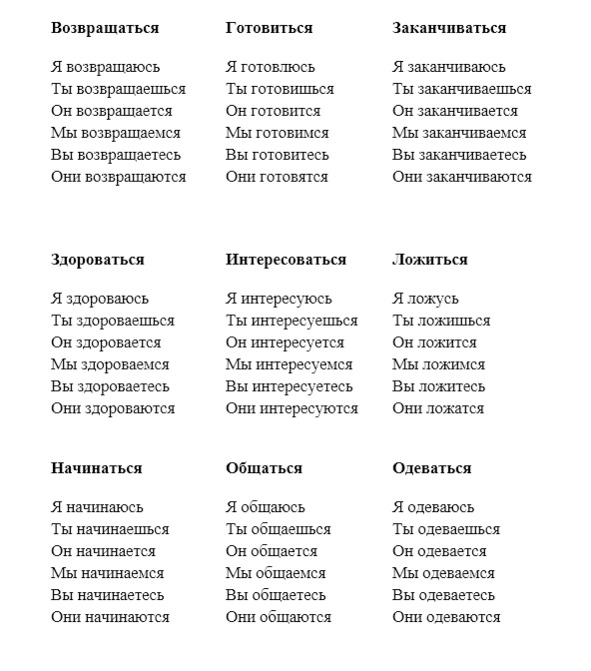
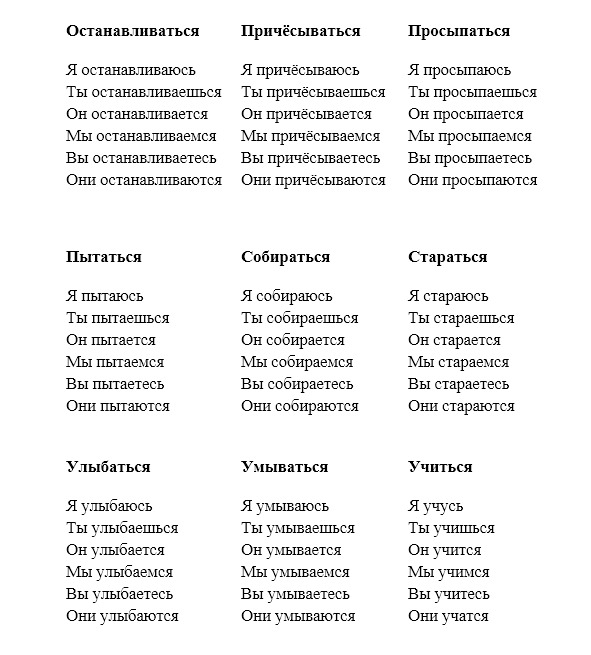
Упражнение 2. Put the verbs in the correct form
Он (возвращаться) домой. Она (улыбаться) ребёнку. Я всегда (умываться) по утрам. Я (учиться) в университете. Мы (собираться) на работу. Ты (просыпаться) рано. Я (пытаться) понять фильм на русском языке. Она (причёсываться) перед зеркалом. Вы (одеваться) хорошо. Автобус (останавливаться) возле университета. Они (ложиться) спать. Я (интересоваться) политикой. Уроки (начинаться) в 9 часов. Ты (здороваться) с учителем. Работа (заканчиваться) вечером. Я (готовиться) к экзаменам.
Упражнение 3. Conjugate verbs
Интересоваться, здороваться, одеваться, останавливаться, причёсываться, просыпаться, пытаться, собираться, учиться, заканчиваться, начинаться, возвращаться, готовиться, мыться, улыбаться, стараться, общаться ложиться, умываться.
Упражнение 4. Make your sentences with reflexive verbs
Упражнение 5. Make your sentence with the word «сам»
There is also the word «сам» in Russian. It can be translated in English as «myself’, «yourself’, «himself’ or «by myself» «by your own» and so on. It is used in a situation when the action is done by subject independently on any assistance, without any helps.
Он сам пишет книгу – He writes a book himself
Она сама готовит завтрак – She cooks breakfast herself
Мы сами переводим текст – We translate the text ourselves

Упражнение 5. Put the words in the gaps
Он… делает домашнее задание. Она… рисует картину. Они… учат русский язык. Инженер… делает работу. Учительница… готовит задания. Дети… прибираются в комнате. Яблоко… падает с дерева. Письмо… отправилось. Здание… разрушилось. Ты… во всём виноват. Она… говорит об этом. Родители… покупают продукты. Студенты… работают по учебнику.
Упражнение 6. Read the text. Find reflexive verbs in the text and translate them.
Привет! Меня зовут Иванова Даша и я хочу рассказать про свой день. Обычно я просыпаюсь в шесть часов утра. Сначала я умываюсь, а потом делаю зарядку. Зарядка помогает мне хорошо себя чувствовать. Затем я иду завтракать. Утром я пью чай или кофе. К сожалению, у меня не всегда получается готовить утром, потому что я тороплюсь на учебу и боюсь опаздывать. К счастью, я опаздываю, очень редко. Я учусь в университете. Он находится в центре города.
Я сама добираюсь до университета на машине, примерно за двадцать или тридцать минут. Занятия начинаются в девять часов утра, а заканчиваются в пять часов вечера. Днём я обедаю в столовой. После занятий я еду домой и делаю домашнее задание. Я учу английский и французский языки, потому что потом хочу работать заграницей и готовлюсь сдавать экзамены. Я всегда стараюсь много заниматься, так как это интересно и полезно. Обычно я сама готовлю ужин и ем в семь часов вечера. После ужина я смотрю фильмы, читаю книги или общаюсь с друзьями в интернете. Я часто ложусь спать в двенадцать часов ночи. Это поздно, поэтому я не всегда высыпаюсь.
Hello! My name is Ivanova Dasha and I want to tell about my day. I usually wake up at six in the morning.
First, I wash my face, and then I do exercises. Exercising helps me feel good. Then I go to have breakfast. In the morning I drink tea or coffee. Unfortunately, I don’t always succeed in cooking in the morning, because I am in a hurry to study and am afraid to be late. Fortunately, I come late very rare. I study at University. It is located in the city center.
I get myself to the university by car, in about twenty or thirty minutes. Classes begin at nine in the morning and end at five in the evening. In the afternoon I have lunch in the dining room. After class, I drive home and do my homework. I study English and French, because I want to work abroad and am getting ready to take exams. I always try to do a lot, as it is interesting and useful. I usually cook dinner myself and eat at seven in the evening. After dinner, I watch movies, read books or chat with friends on the Internet. I often go to bed at twelve in the morning. It’s late, so I don’t always get enough sleep.
Упражнение 7. Write and tell about your day. Use reflexive verbs
Упражнение 8. Ask two interviewees and then compare the answers. Tell about your partner.
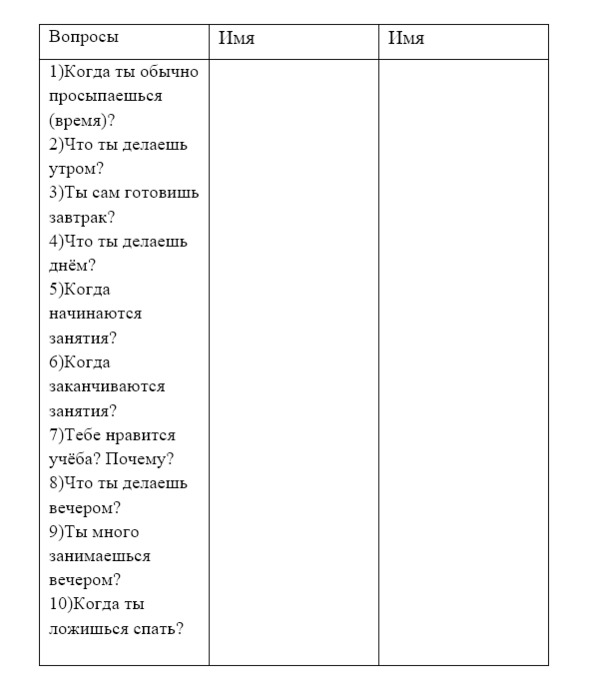
Урок 8. Время. Расписание. Глагол быть. Вопросительное слова «какой, какая, какое, какие»?
Lesson 8. Time. Schedule. Verb быть. The question words«какой, какая, какое, какие»?
Слова:
Сегодня – today
вчера – yesterday
завтра – tomorrow
позавчера – day before yesterday
послезавтра – day after tomorrow
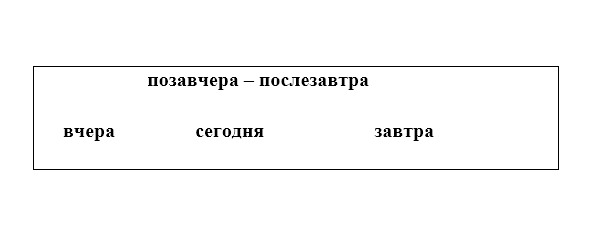
Упражнение 1. Write what day is today, yesterday, tomorrow, day before yesterday, day after tomorrow

